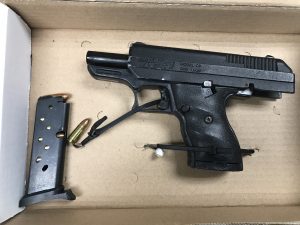 Last week a Baltimore City jury found a 21-year old man not guilty on all counts of gun possession after a circuit court trial, but this type of verdict alone is typically not enough to create news headlines. City prosecutors have recently struggled to earn convictions for gun possession cases due in large part to mistrust of city police offers in the aftermath of the gun trace task force scandal, and an acquittal for a possession charge is hardly out of the ordinary. What made this result newsworthy is the fact that the lead arresting officer is now the commissioner of the Baltimore Police Department.
Last week a Baltimore City jury found a 21-year old man not guilty on all counts of gun possession after a circuit court trial, but this type of verdict alone is typically not enough to create news headlines. City prosecutors have recently struggled to earn convictions for gun possession cases due in large part to mistrust of city police offers in the aftermath of the gun trace task force scandal, and an acquittal for a possession charge is hardly out of the ordinary. What made this result newsworthy is the fact that the lead arresting officer is now the commissioner of the Baltimore Police Department.
At trial the commissioner took the stand and testified how he pulled a vehicle over, in which the defendant was a passenger, for traveling with a broken headlight. According to the acting commissioner, upon the vehicle coming to a stop the defendant immediately took flight. As other officers gave chase the commissioner checked the glove box and allegedly located a handgun. The problem with the state’s case was that the only evidence that the gun belonged to the defendant was the testimony of the officers. Neither the commissioner or his fellow officers had their body cameras activated at the time of the stop, and none provided an adequate explanation for this inexcusable lack of evidence. Further, the commissioner failed to photograph the firearm in the place it was alleged to have been recovered, and the evidence was never submitted to the crime lab for fingerprint or DNA analysis.
In a case like this, where the only evidence of possession is the word of police officers, prosecutors try to convince the jury that it’s a simple open and shut case. They introduce the gun as evidence and sometimes even allow the jurors to hold it (albeit secured in an evidence box). The state will tell the jurors they’ve seen the gun and heard the testimony and the rest is just a distraction. Fortunately for defendants our justice system places a higher burden on the state, and thankfully most jurors take their job seriously, and hold the state to this burden. Jurors can’t simply be expected to believe a police officer simply because he or she comes to court with a badge and a uniform or shirt and tie. This is not to suggest that physical evidence linking the defendant to the gun or drugs at issue is required, but in cases where this evidence is readily available to law enforcement there is no excuse for its absence. In this case officers failed to have their body cameras activated, failed to preserve the crime scene with photographs and did not even consider submitting the gun to the crime lab for print or DNA work. Each of these failures came without justification or explanation, and therefore the jury got it right. Proof beyond a reasonable doubt means that the finder of fact must be sure that the defendant did what the state alleges, and even seasoned officers must be held accountable for sloppy police work. Decades of experience and smooth demeanor on the stand are no replacement for cold hard evidence, and it’s reassuring to know these jurors agreed.
Benjamin Herbst is a gun charge attorney who handles cases in Baltimore and all other state and federal courts in Maryland. Contact Benjamin for a free consultation about your firearm case or the gun laws in Maryland anytime at 410-207-2598.
Resources:
Jury acquits man arrested on gun charge by Baltimore Police commissioner, baltimoresun.com.
 Criminal Defense Lawyer Blog
Criminal Defense Lawyer Blog

